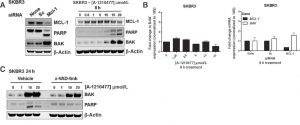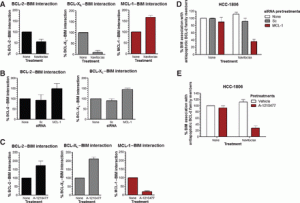| CAS NO: | 1668553-26-1 |
| 规格: | ≥98% |
| 包装 | 价格(元) |
| 5mg | 电议 |
| 10mg | 电议 |
| 25mg | 电议 |
| 50mg | 电议 |
| 100mg | 电议 |
| 250mg | 电议 |
| 500mg | 电议 |
| Molecular Weight (MW) | 850.04 |
|---|---|
| Formula | C46H55N7O7S |
| CAS No. | 1668553-26-1 |
| Storage | -20℃ for 3 years in powder form |
| -80℃ for 2 years in solvent | |
| Solubility (In vitro) | DMSO: 3 mg/mL (3.5 mM) |
| Water: <1 mg/mL (slightly soluble or insoluble) | |
| Ethanol: <1 mg/mL | |
| Synonyms | A-1210477; A 1210477; A1210477 |
| In Vitro | A-1210477 (10 μM) reduces the amount of BIM co-immunoprecipitated with MCL-1 antibody, and triggers MCL-1 elevation in a variety of cancer cell lines, including the breast cancer cell line HCC-1806. A-1210477 inhibits MCL-1-NOXA interactions with an IC50 of approximately 1 μM, while having no effect on BCL-2-BIM or BCL-XL-BCL-XS interactions. The NSCLC cell lines H2110 and H23 are sensitive to A-1210477 with cell viability IC50<10 μM, confirming that A-1210477 can kill MCL-1-dependent cell lines. A-1210477 induces extensive concentration-dependent apoptosis in H929 cells following a brief (4 h) exposure. A-1210477 interacts with MCL-1 with Kd of appr 740 nM. A-1210477 (10 μM) induces extensive mitochondrial fragmentation in a DRP-1-dependent manner[2]. A-1210477 upregulates MCL-1 expression in BRAF-mutant CRC cells and in the melanoma cell line A375 in a dose-dependent manner. A-1210477 releases BAK from MCL-1 and cobimetinib induces BIM that is required for BAX activation. A-1210477 (0, 5, 10 and 15 μM) has minimal effect on cell viability but substantially sensitizes resistant BCL2High NHL cell lines to navitoclax. |
|---|---|
| Kinase Assay | TR-FRET-binding affinity assays are performed for BCL-2, BCL-XL, and MCL-1 in 4.52 mM monobasic potassium phosphate, 15.48 mM dibasic potassium phosphate, 1 mM sodium EDTA, 0.05% Pluronic F-68 detergent, 50 mM sodium chloride, and 1 mM DTT (pH 7.5) for BCL-XL.6 For MCL-1 assays, GST-tagged MCL-1 (1 nM) is mixed with 100 nM f-Bak, 1 nM Tb-labeled anti-GST antibody, and compound at room temperature (RT) for 60 min. Fluorescence is measured on an Envision plate reader using a 340/35 nm excitation filter and 520/525 (f-Bak) and 495/510 nm (Tb-labeled anti-GST antibody) emission filters. |
| Cell Assay | Adherent cell lines are seeded at 50 000 cells per well in 96-well plates and treated for 48 h with compounds diluted in half-log steps starting at 30 μM and ending at 0.001 μM. Multiple myeloma cell lines are seeded at 15 000-20 000 cells per well and treated similarly. Effects on proliferation and viability are determined using CellTiter-Glo reagent from Promega according to the manufacturer's instructions. IC50 values are determined by non-linear regression analysis of the concentration response data. |
| Dosages | N/A |
| Administration | N/A |
| Reference | Blood Cancer J. 2015 Nov 13;5:e368 |
 Loss of MCL-1 function modulates BAK expression. SKBR3 cells were treated with MCL-1 siRNA (#5), scrambled siRNA (Sc; both 20 nmol/L) or the MCL-1 inhibitor A-1210477 for 8 hours and the effect on MCL-1, PARP, and BAK determined by Western blot analysis (A) or by RT-PCR (B). Mol Cancer Ther October 1 2016 15 (10) 2273-2281 |  BCL-XL limits the efficacy of A-1210477 to a greater extent than BCL-2. SKBR3 cells overexpressing BCL-XL or BCL-2 were treated with A-1210477 for 24 hours and the percentage of apoptosis determined from the sub-G0–G1 DNA content of DNA cell-cycle histograms and compared with vector control (Vct Ctrl) or parental cell lines (wild-type, WT). |  BIM redistribution mediated by loss in function of antiapoptotic BCL-2 proteins. |
